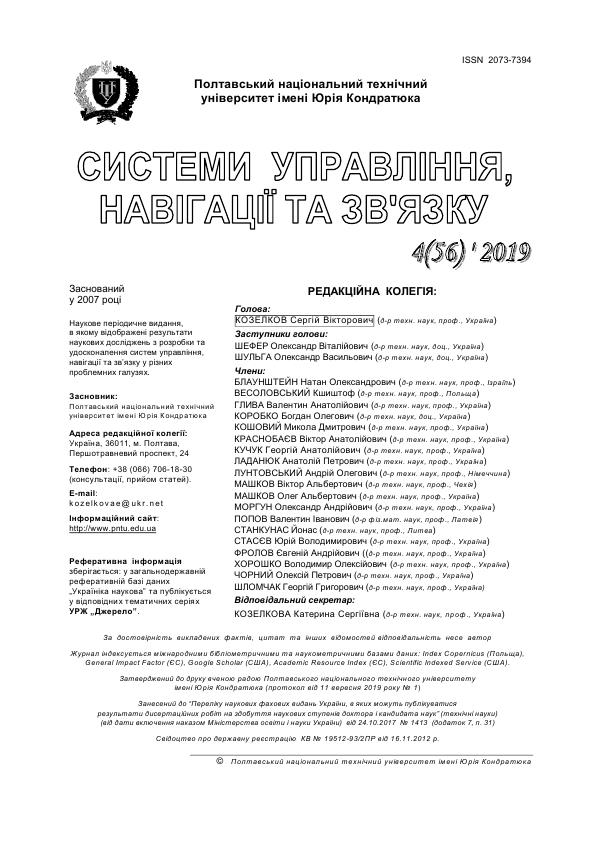SUPPLEMENTING THE INPUT OF THE RECOMMENDATION SYSTEM IN A CYCLIC COLD START SITUATION USING TEMPORAL CONSTRAINTS OF THE “NEXT” TYPE
DOI:
https://doi.org/10.26906/SUNZ.2019.4.105Keywords:
recommendation systems, temporal restrictions, personalization of recommendations, formation of recommendationsAbstract
The subject matter of the article is the formation of the recommended list of goods and services in a situation of a cyclical cold start of the recommendation system. This situation is characterized by a cyclical change in the interests of users, which requires clarification of the source data when building recommendations. The goal is to develop a method of supplementing the input data to build recommendations for non-permanent users who change their requirements, using temporal constraints such as “Next”. Tasks: to highlight the basic features of temporal dependencies in recommendation systems; to develop the concept of adding input data in a situation of cyclic cold start; to develop a method for supplementing input data based on temporal constraints of the “Next” type. The following results are obtained. The temporal dependencies are structured taking into account the features of their application in recommender systems. It is shown that to describe user behavior in such systems, you can use dependencies of the “Next” type between time-consistent selection of the same object, as well as dependencies of the “Future” type with an intermediate choice of other goods or services. A conceptual approach to refine the input data based on temporal dependencies is proposed. Within the framework of the presented conceptual approach, a method is proposed for supplementing the input data of the recommendation system based on the formation of temporal constraints of the “Next” type. Conclusions. The scientific novelty of the results is as follows. A method is proposed for supplementing the input data of a recommender system in a cyclic cold start situation using temporal constraints of the “Next” type. The method includes the steps of summarizing the initial data, forming temporal constraints of the “Next” type, and also supplementing the input data according to the obtained constraints. The proposed method allows to increase the efficiency of constructing recommendations for non-regular users based on the formation of restrictions that reflect mandatory changes in the interests of known users.Downloads
References
Василенко О. Н. Теоретико-числовые алгоритмы в криптографии. М.: МЦНМО, 2003. 328 с.
Ишмухаметов Ш. Т. Методы факторизации натуральных чисел. Казань : Казан. ун-т, 2011, 190 с.
Shor P. W. Polynomial-Time Algorithms for Prime Factorization and Discrete Logarithms on a Quantum Computer // Foundations of Computer Science : Conference Publications. 1997. P.1484–1509.
Manikandan V, Porkodi V, Mohammed AS, Sivaram M, “Privacy Preserving Data Mining Using Threshold Based Fuzzy cmeans Clustering”, ICTACT Journal on Soft Computing, Volume 9, Issue 1, 2018, pp.1813-1816. DOI: 10.21917/ijsc.2018.0252
Porkodi V., Sivaram M., Mohammed A.S., Manikandan V. Survey on White-Box Attacks and Solutions. Asian Journal of Computer Science and Technology. Vol. 7, Is. 3. pp. 28–32.
Amin Salih Mohammed, Saravana Balaji B., Hiwa Abdulkarim Mawlood. Conceptual analysis of Iris Recognition Systems. Advanced Information Systems. 2019. Vol. 3, No. 2. Р. 86-90. DOI : https://doi.org/10.20998/2522-9052.2019.2.15
Saravanan S., Hailu M., Gouse G.M., Lavanya M., Vijaysai R. Optimized Secure Scan Flip Flop to Thwart Side Channel Attack in Crypto-Chip. International Conference on Advances of Science and Technology, ICAST 2018. Lecture Notes of the Institute for Computer Sciences, Social Informatics and Telecommunications Engineering. Vol 274. Springer, Cham. DOI: https://doi.org/10.1007/978-3-030-15357-1_34
Pevnev V. Pseudoprime Numbers: Basic Concepts And The Problem Of Security, 13th International Conference on Information and Communication Technology (ICT) in Education Research and Industrial Applications, 2017. Р. 583-593.
Solovay R., V. Strassen. A fast Monte-carlo test for primality. In: SIAM J. Comput., V. 6, 1977. Р.84-85.
Pevnev V. Investigation of the algorithm for the numbers primality determining Publication Year: 2018, P. 243 – 247
Певнев В. Я., Логвиненко Н.Ф., Шостак А.В. Алгоритм факторизации на основе решения квадратного неравенства Системи обробки інформації . 2001. №.3(13). С.13-16.




